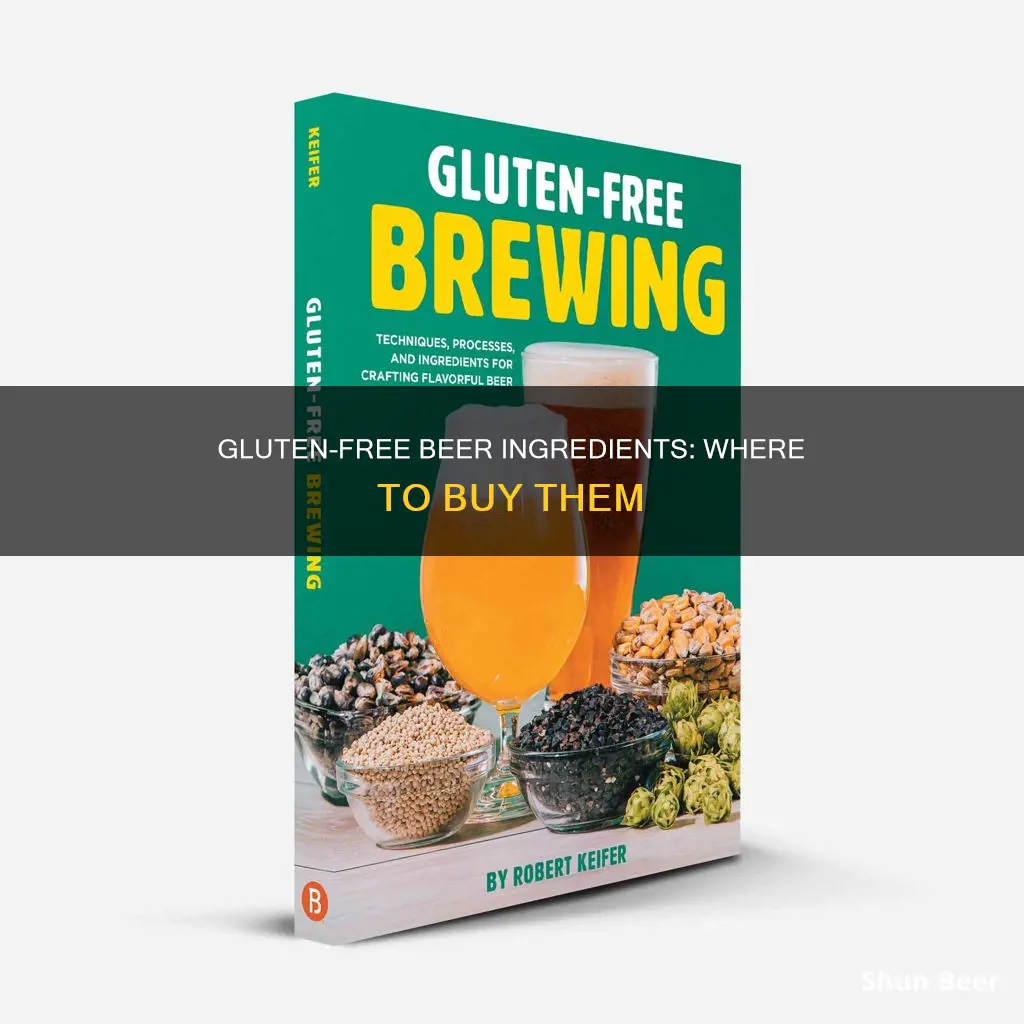
Gluten-free beer can be made using gluten-free grains such as sorghum, rice, millet, buckwheat, quinoa, or maize. These beers often have slightly different aromas and flavours to regular beer. You can find gluten-free beer ingredients at online stores such as Gluten Free Home Brewing Supply, which carries a full line of gluten-free beer ingredients that are also processed in a gluten-free facility.
| Characteristics | Values |
|---|---|
| Ingredients | Gluten-free grains such as sorghum, rice, millet, quinoa, buckwheat, corn, or gluten-free oats |
| Brewing methods | Gluten-free beer can be brewed using two methods: using gluten-free cereals or pseudocereals, or using a gluten-containing malt and then introducing a process to reduce gluten content |
| Availability | Gluten-free beer ingredients can be purchased online or from specialty stores |
| Online retailers | Gluten Free Home Brewing, Grouse Malt House, Eckert Malting, HobbyHomeBrew |
| Online resources | Zero Tolerance Homebrewers club, Zero Tolerance Gluten Free Homebrew Club on Facebook, HomeBrewTalk, Gluten Free Home Brewing store and blog |
What You'll Learn

Gluten-free beer ingredients kits
Types of Gluten-Free Beer Kits:
Gluten-free beer kits come in different varieties, catering to various expertise levels, from beginner to advanced brewers. Some kits are specifically designed for those with gluten sensitivities or celiac disease, ensuring the final product is safe for consumption. You can choose from a range of beer styles, including:
- Everyday European Lager
- English Golden Ale
- Tripple Hopped IPA
- Czech Lager
- Citrus IPA
- Mexican Cerveza
- English Bitter
- American IPA
- Belgian Tripel
- Light Ale
- Amber Ale
- Honey Ale
- Double IPA
- Session IPA
Ingredients Used in Gluten-Free Beer Kits:
The primary ingredient in gluten-free beer kits is gluten-free malt, typically made from grains such as rice, millet, buckwheat, or sorghum. These grains are processed to remove gluten while providing flavour and colour to the beer. Hops are another crucial ingredient, adding bitterness and balancing the sweetness of the malt. Different types of hops like Cascade, Chinook, and Amarillo are used depending on the recipe. Yeast is also included in the kits for fermentation, with options such as ale yeast and lager yeast.
Where to Buy:
Several online stores offer gluten-free beer ingredients kits, such as:
- The Home Brew Shop UK: They offer a range of gluten-free beer kits suitable for all levels, with options for beginners and advanced brewers.
- MoreBeer: MoreBeer provides three different gluten-free beer recipe kits: Light Ale, Amber Ale, and Honey Ale, all free from barley and wheat.
- Ontario Beer Kegs: This website offers a variety of gluten-free extract recipe kits, including American IPA, Belgian Tripel, Double IPA, Light Ale, and Session IPA.
- Gluten Free Brew Supply: While not explicitly mentioned, this website offers ingredients for gluten-free brewing, such as rice malt, yeast, and pre-crushed millet.
- Northern Brewer: Northern Brewer provides information and resources on gluten-free homebrewing, including a guide with expert tips, techniques, and recipes.
Brewing Process:
Gluten-free beer kits come with instructions that should be carefully followed. Gluten-free beers can be delicate, and improper fermentation may lead to off-flavours or spoilage. The process typically involves mashing and boiling the gluten-free grains, just like traditional beer brewing. Some kits may require additional ingredients to be sourced separately, so it's important to check the kit contents before purchasing.
In conclusion, gluten-free beer ingredients kits provide a fantastic opportunity for those with gluten sensitivities to enjoy a delicious, safe, and tailored beer experience. With a variety of kits available online and a straightforward brewing process, anyone can become their own gluten-free brewmaster.
Waffle House Beer: Where to Buy and Try It?
You may want to see also

Gluten-free grains
There are a variety of gluten-free grains that can be used for brewing, each with its own unique characteristics and flavour profiles. Here are some of the most common and popular gluten-free grains used in brewing:
- Sorghum: Sorghum is the most common grain used in gluten-free brewing due to its similar brewing process to barley. It has a distinct fruity aroma and flavour, with a tart aftertaste. Sorghum beers can be a little thin and transparent, but roasting the grain can add a variety of flavours.
- Buckwheat: Buckwheat adds a tart, wheat-like flavour and a nutty character when roasted. It also contains a decent amount of protein, which is good for head retention. However, buckwheat is susceptible to spoilage and must be stored and handled properly.
- Millet: Millet is versatile and may be the closest in flavour to barley. It can be roasted to create toasted and chocolaty flavours and add colour to the beer. It can also be used to add sweetness without adding too much gravity.
- Quinoa: Quinoa adds a quinoa-like flavour to the beer, and when roasted, it can add a toasty or biscuity flavour. It is high in protein and helps with head retention. It is important to rinse quinoa before brewing to remove its natural repellent, saponins.
- Rice: Rice can be used as an adjunct to lighten the flavour of the beer. It does not have a lot of protein, so it does not aid in head retention.
- Chestnuts: Chestnuts add a nice roasted, nutty flavour to darker beers like brown ales, stouts, and porters. They don't provide much fermentable sugar, but they can be a great flavour addition.
- Amaranth: Amaranth has a mild, slightly nutty flavour and is high in protein, making it excellent for head retention. It is often added to stouts and porters.
- Oats: Oats are used as an adjunct in barley-based beers like oatmeal stouts. They improve mouthfeel and add a smooth texture. However, not all oats are gluten-free, so certified gluten-free oats must be selected.
These gluten-free grains can be used to create delicious and creative gluten-free beers, including ales, Belgian whites, and India pale ales (IPAs). With the right ingredients and techniques, brewing gluten-free beer can result in a product that meets or exceeds the quality of traditional barley-based beers.
Last Call for Beer: Sheetz Shopping Late at Night
You may want to see also

Gluten-free yeast
Types of Gluten-Free Yeast
The most common types of gluten-free yeast used in beer brewing include:
- Baker's yeast: This yeast is specifically designed for baking and is typically gluten-free. Active dry yeast and instant yeast are subtypes of baker's yeast that are also gluten-free.
- Autolyzed yeast: While autolyzed yeast is gluten-free, be cautious of "autolyzed yeast extract," which is often derived from barley and contains gluten.
- Active dry yeast: This subtype of baker's yeast is also gluten-free and can be purchased from brands like Bob's Red Mill and Fleischmann's.
- Instant yeast: Instant yeast is similar to active yeast but can be added directly to dry ingredients. It is gluten-free and convenient for brewing processes.
Yeast to Avoid
When brewing gluten-free beer, it is crucial to avoid brewer's yeast unless it is specifically labelled as gluten-free. Brewer's yeast is typically a byproduct of the beer-brewing process and often contains gluten from the barley used in beer production. However, there are a few brands that create gluten-free brewer's yeast using sugar beets, such as Bluebonnet Super Earth and Lewis Labs.
Additional Considerations
When purchasing yeast, always read the labels carefully and opt for products that are clearly labelled as gluten-free. Some manufacturers may not disclose the source of their yeast extract, so it is essential to choose products that provide clear gluten-free labelling or confirmation from the manufacturer. Additionally, be cautious of cross-contamination risks, especially when using fresh yeast from bakeries, as it may be used in an environment where gluten-containing flour is also present.
Peroni Beer: Where to Buy and Enjoy It
You may want to see also

Gluten-free hops
Hops are naturally gluten-free. They are flowers added during beer production for flavour and aroma, and they do not contain gluten proteins. However, the presence of gluten in traditional beer stems from the use of grains such as barley, wheat, or rye.
For those with celiac disease or gluten intolerance, it is important to look for dedicated gluten-free breweries that avoid any use of gluten-containing grains and the risk of cross-contamination. In the UK, beers labelled as 'gluten-free' must contain less than 20 parts per million (ppm) of gluten.
Gluten-free beers are often crafted with grains like rice, quinoa, millet, buckwheat, corn, and sorghum. These do not contain gluten and are safe for people with celiac disease or gluten intolerance.
You can find kits to brew your own gluten-free beer in specialty stores or online. They usually include a sweet sorghum syrup as the main carbohydrate source, as well as yeast, hops, and other flavouring ingredients.
- Bring water to a boil and add the sorghum syrup.
- Add hops and boil for 1 hour.
- Turn off the heat and stir in honey. Let cool.
- Transfer to a clean and sanitized fermenter. Add enough water to make the desired amount of liquid, usually around 5 gallons (19 litres). Discard the yeast.
- Ferment the beer and place it in sanitized bottles with corn sugar.
Gluten-free beer can be made at home similarly to traditional beer, but with gluten-free ingredients.
When to Buy Beer in Cabell County, WV
You may want to see also

Gluten-free home brew clubs
Gluten-free home brewing is a fun challenge for those who love beer but suffer from gluten intolerance or celiac disease. The process is similar to traditional beer-making, but with gluten-free ingredients. The only part of the recipe that needs to be changed is the malt, which supplies the sugar that yeast consumes to make alcohol.
Gluten-free fermentables
- White sorghum: This crop is native to Africa, Asia, and the Pacific and is 100% gluten-free.
- Rice: A gluten-free grain used in Asian countries where barley doesn't grow natively. An added enzyme is needed to convert starch into sugar during the boil.
- Belgian Candi Sugar: Made from beets and completely gluten-free, these can be added to boost the colour or alcohol content of your brew.
Gluten-free yeast options
- Omega Yeast OYL-071 Lutra™ Kveik: A gluten-free yeast that is perfect for brewing a gluten-free hard seltzer, alcopop, mead, cider, or beer.
- Propper Seltzer™ Yeast Nutrient: Omega Yeast's gluten-free nutrient that supports sugar-based fermentations like mead, cider, wine, and hard kombucha.
Gluten-reduced beer kits
Clarity Ferm: An innovative enzyme that breaks down gluten proteins during fermentation, achieving levels below 20ppm while preserving the flavour, aroma, and quality of your brew.
Other gluten-free drinks
Wine, cider, and kombucha are other naturally gluten-free drinks that can be made at home.
Where to buy gluten-free beer ingredients
Gluten-free beer ingredients can be purchased online or from specialty stores. Gluten Free Home Brewing supply store is one such example, carrying a full line of gluten-free beer ingredients that are also processed in a gluten-free facility. Northern Brewer also carries a mix of products to help you brew gluten-free beer.
Ommegang Game of Thrones Beer: Where to Buy?
You may want to see also







